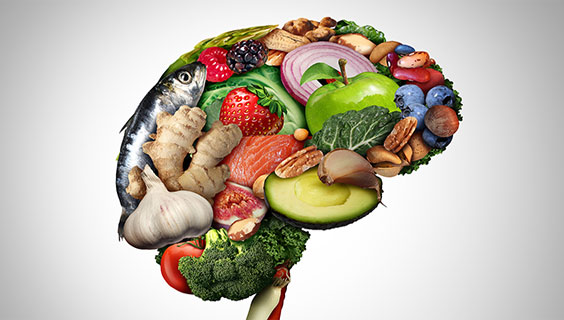As seniors get older, a fear is that they will begin to show a decline in mental sharpness or suffer from dementia which is described as memory loss so severe that it impacts daily living. Alzheimer’s disease is the most common type of dementia and currently, only a few treatments have been shown to be effective in slowing the disease – there is no cure.
But while many believe memory loss and dementia are just an unfortunate part of the aging process, a growing number believe that brain foods and vitamin supplements can stop or at least slow the onset of cognitive decline.
In fact, a recent survey showed that over 25% of adults over the age of 50 take a supplement to improve their brain health or help keep their memory sharp. The problem is, there is often little proof that any of these supposed brain supplements actually work. Of all of the different supplements for brain health on the market, only two have shown real promise; vitamin E and B vitamins.
Two Promising Brain Health Supplements
Vitamin E
Vitamin E is an antioxidant that appears to help sustain brain health by reducing oxidative stress on brain cells. Vitamin E doesn’t decrease the risk of Alzheimer’s but may slow its progression.
Taking too much vitamin E is dangerous. Always consult with a doctor before taking vitamin E.
B Vitamins
B vitamins appear to help break down homocysteine which at high levels has been associated with a risk of dementia or Alzheimer’s disease. A healthy diet, however, already provides enough of these essential B vitamins so there’s typically no need for a B vitamin supplement.
What About Fish Oil?
Fish is an important component of the Mediterranean diet and studies show that Omega-3 fatty acid from foods such as fish, plant or nut oils are linked to a lower risk of Alzheimer’s disease. Currently, however, more double-blind studies using placebos are needed to determine if fish oil supplements can provide any benefit to brain health.
Healthy Brain Foods
While the research is out for many brain supplements, there is growing research that a healthy diet can potentially slow brain aging by up to 7 years or more while reducing the risk of Alzheimer’s disease. Two diets that brain health researchers have been particularly interested in are the Mediterranean diet and the DASH diet which both have decades of research behind them.
The Mediterranean Diet
The Mediterranean diet helps cardiovascular function and provides anti-inflammatory benefits. The diet includes foods that are rich in antioxidants as well as monounsaturated and omega-3 fats which have been associated with a lower risk of cognitive decline and dementia. The diet recommends more fruits and vegetables while reducing red meat, eating more fish that contains omega-3 fats, and cooking with extra virgin olive oil.
The DASH Diet
The DASH diet, on the other hand, is focused on preventing high blood pressure and hypertension. Dash stands for Dietary Approaches to Stop Hypertension. The DASH diet recommends reducing sodium and eating a diet that contains plenty of nutrients like potassium, calcium, and magnesium that help reduce blood pressure. The DASH diet includes lots of whole grains, fruits and vegetables, and low-fat dairy products. The DASH diet emphasizes eating balanced portion sizes and eating a variety of healthy foods and nutrients.
A New Diet for Brain Health – The MIND Diet
The MIND diet, created by university researchers, combines foods and concepts from both the Mediterranean and DASH diet to create a diet specifically rich in foods and nutrients that support brain health and reduce the risk of Alzheimer’s disease. The MIND diet includes:
Green Leafy Vegetables
Green leafy vegetables like kale, collard greens, spinach, or lettuce have been shown to help lower the risk of dementia and cognitive decline.
Blueberries and Strawberries
A 20-year study showed that older adults who ate blueberries and strawberries had the slowest rates of cognitive decline. Researchers believe the high level of flavonoids in berries provides the benefit.
Nuts for Protein
Cut out junk food and switch to nuts. Nuts are packed with fat-soluble vitamin E which is known for helping sustain brain health. Make sure to get unsalted nuts to cut the sodium.
More Fish
A memory study showed that adults 65 and older who ate fish once a week scored better on memory tests and number puzzles than those who ate fish less often.
Less Meat
Try eating more beans, lentils, and soybeans which provide protein and fiber and are rich in B vitamins that support brain health.
Cook with Olive Oil
Olive oil is a key component of the Mediterranean diet. Avoid butter and margarine and cook with olive oil instead. The best olive oil is extra virgin olive oil.
Ultimately, it turns out that a brain health supplement may not the answer we are looking for. Instead, eating a diet of fruits, vegetables, and healthy fats while cutting down on salt, highly saturated fats, and empty calories can potentially help overall brain health more than a supplement ever will.
References:
- McEvoy CT, et al. Neuroprotective diets are associated with better cognitive function: The health and retirement study. Journal of the American Geriatric Society;65:1857.
- Morris MC, et al. MIND diet slows cognitive decline with aging. Alzheimer’s & Dementia. 2015;11:1015.
- Morris MC, et al. MIND diet associated with reduced incidence of Alzheimer’s disease. Alzheimer’s & Dementia. 2015;11:1007.
- Morris MC, et al. Nutrients and bioactives in green leafy vegetables and cognitive decline. Neurology. 2018;90:e2:14.
- Devore EE, et al. Dietary intakes of berries and flavonoids in relation to cognitive decline. Annals of Neurology. 2012;72:135.
- Chen X, et al. Lower intake of vegetables and legumes associated with cognitive decline among illiterate elderly Chinese: A 3-year cohort study. Journal of Nutrition, Health and Aging. 2012;16:549.
- Qin B, et al. Fish intake is associated with slower cognitive decline in Chinese older adults. Journal of Nutrition. 2014;144:1579.
- Gutwinski S, et al. Drink and think: Impact of alcohol on cognitive functions and dementia — Evidence of dose-related effects. Pharmacopsychiatry. 2018;51:136.
- World Health Organization. World report on ageing and health. http://apps.who.int/iris/bitstream/10665/186463/1/9789240694811_eng.pdf?ua=1. Published 2015.
- Ortman JM, Velkoff VA, Hogan H; US Census Bureau. An aging nation: the older population in the United States. https://www.census.gov/prod/2014pubs/p25-1140.pdf. Published May 2014.
- Langa KM, Larson EB, Crimmins EM, et al. Comparison of the prevalence of dementia in the United States in 2000 and 2012. JAMA Intern Med. 2017;177(1):51-58.
- Dementia fact sheet. World Health Organization website. http://www.who.int/mediacentre/factsheets/fs362/en/. Updated December 2017. Accessed January 23, 2018.
- Casas R, Sacanella E, Estruch R. The immune protective effect of the Mediterranean diet against chronic low-grade inflammatory diseases. Endocr Metab Immune Disord Drug Targets. 2014;14(4):245-254.
- Estruch R, Ros E, Salas-Salvadó J, et al. Primary prevention of cardiovascular disease with a Mediterranean diet. N Engl J Med. 2013;368(14):1279-1290.
- Samieri C, Sun Q, Townsend M, et al. The association between dietary patterns at midlife and health in aging: an observational study. Ann Intern Med. 2013;159(9):584-591.
- Lourida I, Soni M, Thompson-Coon J, et al. Mediterranean diet, cognitive function, and dementia: a systematic review. Epidemiology. 2013;24(4):479-489.
- van de Rest O, Berendsen AA, Haveman-Nies A, de Groot LC. Dietary patterns, cognitive decline, and dementia: a systematic review. Adv Nutr. 2015;6(2):154-168.
- Feart C, Samieri C, Barberger-Gateau P. Mediterranean diet and cognitive health: an update of available knowledge. Curr Opin Clin Nutr Metab Care. 2015;18(1):51-62.
- Singh B, Parsaik AK, Mielke MM, et al. Association of Mediterranean diet with mild cognitive impairment and Alzheimer’s disease: a systematic review and meta-analysis. J Alzheimers Dis. 2014;39(2):271-282.
- Olsson E, Karlström B, Kilander L, Byberg L, Cederholm T, Sjögren P. Dietary patterns and cognitive dysfunction in a 12-year follow-up study of 70 year old men. J Alzheimers Dis. 2015;43(1):109-119.
- Samieri C, Grodstein F, Rosner BA, et al. Mediterranean diet and cognitive function in older age. Epidemiology. 2013;24(4):490-499.
- Vercambre MN, Grodstein F, Berr C, Kang JH. Mediterranean diet and cognitive decline in women with cardiovascular disease or risk factors. J Acad Nutr Diet. 2012;112(6):816-823.
- Martínez-Lapiscina EH, Clavero P, Toledo E, et al. Mediterranean diet improves cognition: the PREDIMED-NAVARRA randomised trial. J Neurol Neurosurg Psychiatry. 2013;84(12):1318-1325.
- Valls-Pedret C, Sala-Vila M, Serra-Mir M, et al. Mediterranean diet and age-related cognitive decline: a randomized clinical trial. JAMA Intern Med. 2015;175(7):1094-1103.
- Morris MC, Tangney CC, Wang Y, et al. MIND diet slows cognitive decline with aging. Alzheimers Dement. 2015;11(9):1015-1022.
- Morris MC. Nutrition and risk of dementia: overview and methodological issues. Ann N Y Acad Sci. 2016;1367(1):31-37.
- Psaltopoulou T, Kyrozis A. Stathopoulos P, Trichopoulos D, Vassilopoulos D, Trichopoulou A. Diet, physical activity and cognitive impairment among elders: the EPIC-Greece cohort (European Prospective Investigation into Cancer and Nutrition). Public Health Nutr. 2008;11(10):1054-1062.
- Samieri C, Okereke OI, E Devore E, Grodstein F. Long-term adherence to the Mediterranean diet is associated with overall cognitive status, but not cognitive decline, in women. J Nutr. 2013;143(4):493-499.
- Titova OE, Ax E, Brooks SJ, et al. Mediterranean diet habits in older individuals: associations with cognitive functioning and brain volumes. Exp Gerontol. 2013;48(12):1443-1448.
- Gu Y, Brickman AM, Stern Y, et al. Mediterranean diet and brain structure in a multiethnic elderly cohort. Neurology. 2015;85(20):1744-1751.
- Mosconi L, Murray J, Tsui WH, et al. Mediterranean diet and magnetic resonance imaging-assessed brain atrophy in cognitively normal individuals at risk for Alzheimer’s disease. J Prev Alzheimers Dis. 2014;1(1):23-32.
- McEvoy CT, Guyer H, Langa KM, Yaffe K. Neuroprotective diets are associated with better cognitive function: The Health and Retirement study. J Am Geriatr Soc. 2017;65:1857-1862.
- Anastasiou CA, Yannakoulia M, Kosmidis MH, et al. Mediterranean diet and cognitive health: initial results from the Hellenic Longitudinal Investigation of Aging and Diet. PLoS One. 2017;12(8):e0182048.
- Luciano M, Corley J, Cox SR, et al. Mediterranean-type diet and brain structural change from 73 to 76 years in a Scottish cohort. Neurology. 2017;88:449-455.
- Sonnega A, Faul JD, Ofstedal MB, Langa KM, Phillips JW, Weir DR. Cohort profile: the Health and Retirement Study (HRS). Int J Epidemiol. 2014;43(2):576-585.
- The Lothian Birth Cohorts of 1921 and 1936 website. http://www.lothianbirthcohort.ed.ac.uk. Accessed February 1, 2018.
- Ortega R. Importance of functional foods in the Mediterranean diet. Public Health Nutr. 2006;9(8A):1136-1140.
- Scarmeas N, Stern Y, Tang MX, Mayeux R, Luchsinger JA. Mediterranean diet and risk for Alzheimer’s disease. Ann Neurol. 2006;59(6):912-921.
- Scarmeas N, Luchsinger JA, Stern Y, et al. Mediterranean diet and magnetic resonance imaging-assessed cerebrovascular disease. Ann Neurol. 2011;69(2):257-268.
- Gardener H, Scarmeas N, Gu Y, et al. Mediterranean diet and white matter hyperintensity volume in the Northern Manhattan Study. Arch Neurol. 2012;69(2):251-256.
- A closer look at current intakes and recommended shifts. Office of Disease Prevention and Health Promotion, US Department of Health and Human Services website. https://health.gov/dietaryguidelines/2015/guidelines/chapter-2/a-closer-look-at-current-intakes-and-recommended-shifts/. Accessed March 1, 2018.
- Morris MC, Wang Y, Barnes LL, Bennett DA, Dawson-Hughes B, Booth SL. Nutrients and bioactives in green leafy vegetables and cognitive decline. Neurology. 2018;90(3):e214-e222.


